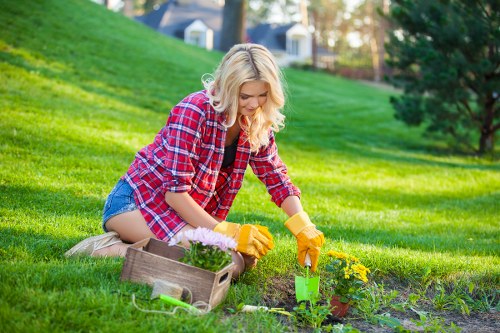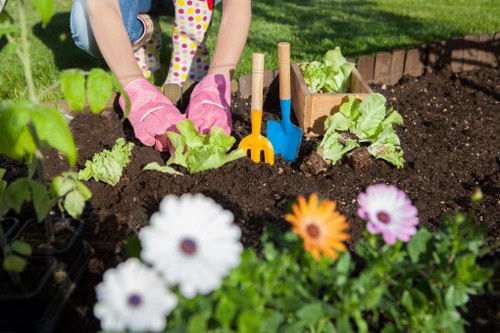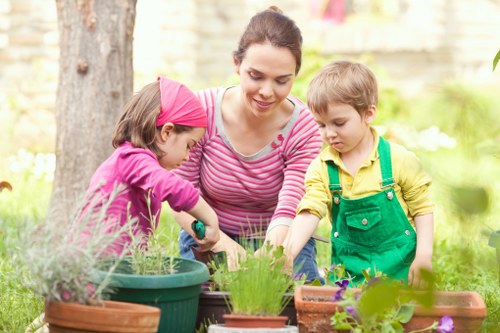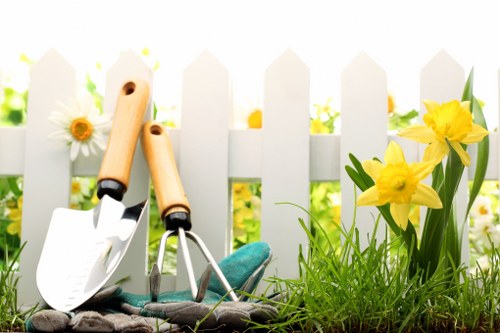Comprehensive Guide to Garden Maintenance in Notting Hill
Introduction to Garden Maintenance

Maintaining a beautiful garden in Notting Hill requires a blend of knowledge, dedication, and the right techniques. Whether you’re a seasoned gardener or a novice, understanding the essentials of garden maintenance can transform your outdoor space into a lush, vibrant oasis.
Notting Hill’s unique climate and urban setting present both opportunities and challenges for garden enthusiasts. From the mild weather to the occasional rainfall, your garden can thrive with proper care and attention.
In this article, we will explore various aspects of garden maintenance specific to Notting Hill, providing you with actionable tips and strategies to keep your garden in top shape year-round.
Understanding Notting Hill’s Climate

Notting Hill enjoys a temperate maritime climate, characterized by mild winters and cool summers. This climate is conducive to a wide variety of plants, but it also means gardeners must be mindful of specific environmental factors.
The average annual rainfall ensures that plants receive adequate moisture, reducing the need for constant watering. However, it’s essential to implement proper drainage to prevent waterlogging, which can be detrimental to plant health.
Additionally, understanding the seasonal changes in Notting Hill can help you plan your garden maintenance schedule effectively. From planting in spring to preparing for the colder months, timing is crucial for successful garden upkeep.
Essential Garden Tools for Maintenance

Having the right tools is fundamental to effective garden maintenance. Investing in quality equipment can make tasks easier and more efficient, ensuring your garden remains well-maintained.
- Pruning Shears: Ideal for trimming and shaping plants.
- Garden Fork: Useful for aerating soil and removing weeds.
- Rakes: Essential for gathering leaves and smoothing soil.
- Watering Can: Necessary for providing adequate hydration to your plants.
- Gloves: Protect your hands while working in the garden.
Regularly maintaining your garden tools is also important. Clean, sharpen, and store your equipment properly to extend its lifespan and maintain performance.
Plant Selection and Care

Selecting the right plants is a cornerstone of successful garden maintenance in Notting Hill. Opt for species that thrive in the local climate and soil conditions.
Perennials are an excellent choice as they return year after year, reducing the need for replanting. Additionally, incorporating native plants can attract local wildlife and promote biodiversity.
Proper care involves regular watering, fertilizing, and monitoring for pests and diseases. Implementing a routine care schedule helps ensure your plants remain healthy and vibrant throughout the seasons.
Soil Health and Fertilization

The foundation of any thriving garden is healthy soil. Conducting soil tests can provide valuable insights into nutrient levels and pH balance, enabling you to make informed decisions about fertilization and soil amendments.
- Organic Compost: Enhances soil structure and fertility.
- Mulching: Helps retain moisture and suppress weeds.
- Natural Fertilizers: Provide essential nutrients without harming the environment.
Regularly amending your soil with organic matter improves its texture and nutrient content, promoting robust plant growth and resilience against environmental stressors.
Pest and Disease Management
Effective garden maintenance includes proactive pest and disease management. Identifying potential threats early can prevent significant damage to your plants.
- Regular Inspection: Check plants frequently for signs of pests or diseases.
- Integrated Pest Management (IPM): Combines biological, cultural, and chemical methods for sustainable control.
- Natural Remedies: Utilize insecticidal soaps and organic treatments to manage infestations.
Maintaining plant health through proper watering and nutrient management can also reduce susceptibility to pests and diseases.
Pruning and Trimming Techniques
Pruning and trimming are essential for shaping plants, promoting healthy growth, and enhancing the overall aesthetics of your garden.
Timing is critical when pruning different types of plants. For instance, many shrubs and trees benefit from pruning in late winter or early spring before new growth begins.
Use clean, sharp tools to make precise cuts, and remove any dead or diseased branches to maintain plant health.
Seasonal Garden Maintenance Tasks
- Spring: Plant new flowers, fertilize existing plants, and clean garden beds.
- Summer: Regular watering, deadheading, and pest control.
- Autumn: Remove fallen leaves, mulch garden beds, and prepare plants for winter.
- Winter: Protect sensitive plants, prune dormant trees, and plan for the upcoming growing season.
Adhering to a seasonal maintenance schedule ensures that your garden remains healthy and vibrant throughout the year.
Lawn Care in Notting Hill
A well-maintained lawn adds significant value and beauty to your garden. Regular mowing, aerating, and fertilizing are key to keeping your grass green and lush.
Addressing common lawn issues such as weeds, pests, and diseases promptly can prevent them from spreading and causing extensive damage.
Consider incorporating sustainable practices like using organic fertilizers and responsible watering techniques to maintain a healthy lawn while minimizing environmental impact.
Hardscape Maintenance
Hardscape elements like pathways, patios, and sheds require regular upkeep to ensure they remain functional and aesthetically pleasing.
Cleaning surfaces, repairing any damage, and maintaining structural integrity are essential aspects of hardscape maintenance.
Incorporating decorative elements such as lighting and furniture can enhance the usability and appeal of your garden's hardscape features.
Water Features and Irrigation Systems
Water features like fountains, ponds, and irrigation systems add both beauty and functionality to your garden. Proper maintenance ensures they operate efficiently and remain attractive.
Regularly clean and inspect water features to prevent algae buildup and mechanical issues. Adjusting irrigation systems based on seasonal changes can optimize water usage and promote plant health.
Incorporating sustainable water practices, such as rainwater harvesting, can enhance your garden's resilience and reduce dependency on external water sources.
Garden Décor and Accessories
Incorporating garden décor and accessories can personalize your outdoor space and make it more inviting. Items such as garden statues, benches, and decorative lighting contribute to the overall ambiance.
Choosing weather-resistant materials ensures that your garden accents remain beautiful and functional throughout the year.
Regularly updating and maintaining these elements keeps your garden looking fresh and stylish.
Eco-Friendly Gardening Practices
Adopting eco-friendly gardening practices not only benefits the environment but also promotes a healthier garden ecosystem. Sustainable methods reduce waste, conserve resources, and support biodiversity.
- Composting: Recycle organic waste to create nutrient-rich compost for your garden.
- Rainwater Harvesting: Collect and use rainwater for irrigation, reducing reliance on mains water.
- Native Planting: Choose native species that require less maintenance and support local wildlife.
Implementing these practices fosters a sustainable garden that thrives with minimal environmental impact.
Professional Garden Maintenance Services
While DIY garden maintenance is rewarding, professional services can offer expertise and efficiency, especially for larger or more complex gardens.
Professional gardeners can provide tailored maintenance plans, ensuring that your garden receives the right care at the right time. They bring experience in plant selection, landscaping, and problem-solving, enhancing the overall health and appearance of your garden.
Hiring a professional service can also free up your time, allowing you to enjoy your garden without the stress of constant upkeep.
DIY vs. Professional Maintenance: Making the Right Choice
Deciding between DIY and professional garden maintenance depends on various factors, including your schedule, expertise, and the specific needs of your garden.
- DIY: Cost-effective and fulfilling for those who enjoy hands-on gardening.
- Professional: Ideal for complex gardens, time-constrained individuals, or those seeking expert guidance.
Consider a hybrid approach, handling routine tasks yourself while outsourcing specialized services to professionals. This balance can optimize both cost and garden health.
Common Garden Maintenance Mistakes to Avoid
Even with the best intentions, gardeners can make mistakes that hinder garden growth and beauty. Being aware of these common pitfalls can help you maintain a thriving garden.
- Overwatering: Excessive moisture can lead to root rot and other plant diseases.
- Ignoring Soil Health: Poor soil conditions can stunt plant growth and reduce resilience.
- Improper Pruning: Incorrect pruning techniques can damage plants and hinder their development.
- Neglecting Pest Control: Allowing pests to flourish can cause extensive damage to your garden.
- Ignoring Seasonal Changes: Failing to adjust maintenance practices based on seasons can negatively impact plant health.
By avoiding these mistakes, you can ensure your garden remains healthy, vibrant, and beautiful throughout the year.
Conclusion: Sustaining a Beautiful Garden in Notting Hill
Effective garden maintenance in Notting Hill is a blend of understanding local conditions, utilizing the right tools and techniques, and adopting sustainable practices. Whether you tend to your garden yourself or enlist professional services, consistent care and attention are key to creating a stunning outdoor space.
Embrace the unique opportunities that Notting Hill’s climate and community offer, and enjoy the rewards of a well-maintained garden that enhances both your home and the surrounding environment.
Contact us today to learn more about our garden maintenance services and take the first step towards a flourishing garden in Notting Hill!